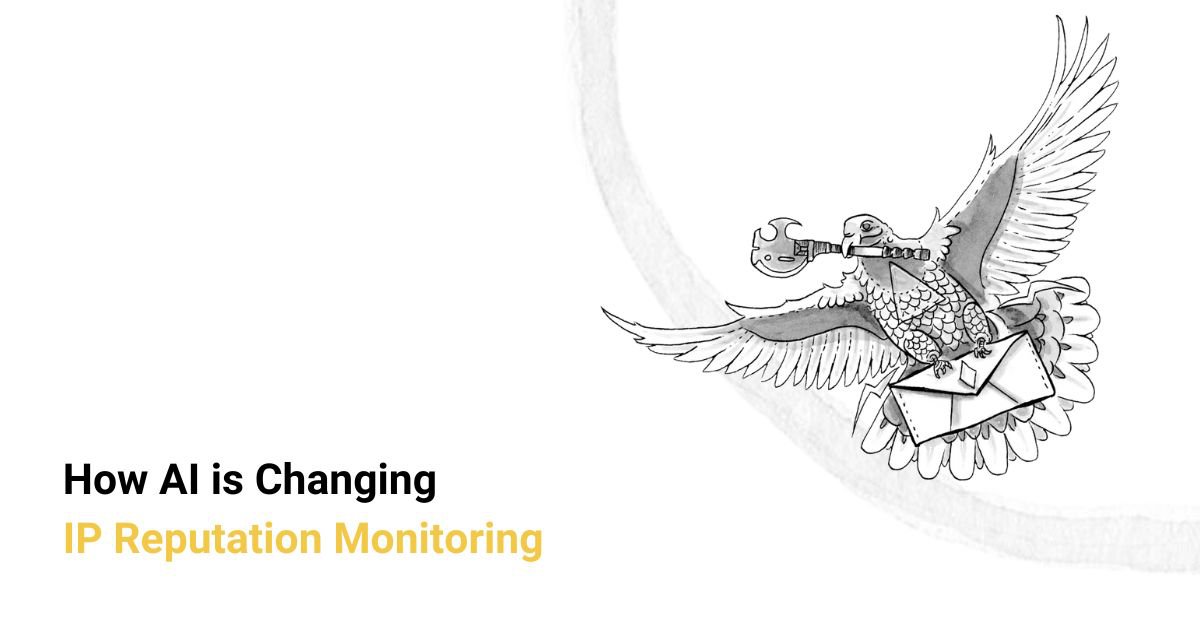Email marketing campaigns still remain one of the most effective communication tools for reaching out to the target audience. However, email deliverability presents a major challenge. Email marketing relies heavily on a strong IP reputation to ensure messages reach their intended recipients. However, monitoring and maintaining a good IP reputation is a complex task requiring a proactive approach.
By taking advantage of AI-powered tools, businesses can track and maintain IP health, improve email deliverability, and avoid reputation-related issues. In this blog, we explain the fundamentals of IP reputation, understand the role of AI in IP reputation monitoring, and explore the benefits and challenges of using AI technologies. Let’s get into it.
Summarizing the Key Factors:
- AI uses machine learning for deliverability. It analyzes large datasets to detect IP reputation issues in real-time.
- AI models use predictive analytics to anticipate and prevent IP reputation-related problems before they impact the email sender's reputation.
- AI-powered tools provide automated alerts and actionable insights to help businesses maintain a strong sender reputation.
- AI-driven solutions improve efficiency and accuracy, reducing the manual effort required for reputation monitoring.
What is IP Reputation Monitoring?
IP reputation monitoring is the process of tracking and managing the trustworthiness of an IP address used for sending emails. Internet service providers (ISPs), email service providers (ESPs), and various security systems evaluate the sender’s IP address to determine if incoming emails are legitimate or spam.
A good IP reputation means emails are more likely to land in recipients' inboxes, while a poor reputation results in messages being diverted to spam folders or blocked entirely. Businesses relying on bulk email campaigns, such as eCommerce platforms, financial institutions, and SaaS providers, need a strong IP reputation to reach high email deliverability rates.
The Role of AI in IP Reputation Monitoring
AI (artificial intelligence) has significantly improved IP reputation monitoring by offering real-time data processing, predictive insights, and automation. Let's walk you through the list for convenience.
Real-Time Data Analysis
AI can analyze vast amounts of data in real-time, allowing businesses to detect reputation issues much faster than manual monitoring. While traditional methods rely on post-incident analysis, AI-powered reputation management systems identify IP reputation threats as they happen.
For example, if an email campaign results in an unusual spike in spam complaints, AI helps alert administrators, allowing them to pause the campaign, investigate the issues, and adjust email marketing strategies accordingly.
Predictive Insights and Pattern Recognition
AI-powered machine learning algorithms analyze historical email-sending patterns to identify potential risks before they impact reputation. By recognizing abnormal recipient behavior, AI can predict if an IP is at risk of being blacklisted, allowing email marketers to take all necessary precautions.
A sudden increase in email sending volume may trigger spam filters, causing IP reputation issues. AI tools detect such anomalies and recommend sending limit adjustments to maintain a positive reputation.
Automation and Scalability
AI automates repetitive tasks like blacklist monitoring, spam complaint detection, and bounce rate analysis. AI-powered tools scale effortlessly across multiple IP addresses, allowing business owners and email marketers to monitor multiple campaigns efficiently. This boosts overall productivity and optimizes resource utilization, streamlining email campaigns.
How AI Improves IP Reputation Monitoring
Advanced AI algorithms can play a crucial role in monitoring sender behavior, detecting potential reputation risks, and optimizing email performance. Here are three ways in which AI helps improve IP reputation:
Early Detection of Reputation Issues
AI identifies poor sending behaviors before they cause significant damage. Common indicators of declining reputation include higher bounce rates and lower conversion rates, click-through rates, and deliverability rates.
For instance, AI tools detect when recipients frequently mark emails as spam and suggest personalized content or audience segmentation strategies to improve email delivery. Additionally, AI can help identify and remove inactive email addresses faster, reducing bounce rates.
Enhanced Accuracy in Spam Detection
AI-driven spam filters analyze email content, recipient behavior, and IP and domain reputation over time. Unlike static spam filters, AI-powered reputation management tools continuously learn from past user behavior and improve email-sending practices, causing fewer false positives and better email deliverability.
Insights for Continuous Improvement
AI provides actionable insights for improving email marketing strategies, such as personalizing email subject lines, send time optimization, and maintaining list hygiene. By leveraging machine learning and analyzing customer sentiment, businesses can refine their strategies, improve customer experience, and significantly boost engagement metrics.

Benefits of AI-Powered IP Reputation Monitoring
AI has revolutionized IP reputation monitoring by enabling businesses to track, analyze, and respond to issues faster than ever before. Let's analyze the top three benefits of using AI models in your email marketing efforts.
Faster Resolution of Problems
One of the most significant advantages of AI tools is the speed at which they detect threats. Unlike traditional monitoring methods that rely on periodic checks, AI continuously scans vast amounts of data in real time.
Thanks to this constant analysis, issues such as spam complaints, blacklisting, or unusual sending patterns are identified as soon as they occur. So, businesses can bypass spam filters and prevent their IPs from being blocked or marked as spam.
Reduced Manual Effort
Another key benefit of using AI is the diminished need for manual intervention. Before AI, teams had to dedicate significant time and resources to monitor IP reputation manually. They had to check blacklists, analyze deliverability rates, and investigate fluctuations in email performance.
With AI-driven automation, these processes are handled efficiently by AI models that perform thousands of checks simultaneously. The result is a streamlined workflow where email marketing teams can focus more on campaign strategy rather than troubleshooting reputation issues.
Improved Deliverability and ROI
AI also improves the accuracy of IP reputation assessments. Traditional monitoring tools often relied on static rules and historical data, which sometimes led to false positives or inaccurate predictions. AI-powered tools, on the other hand, use machine learning and natural language processing to analyze vast datasets and recognize subtle patterns that might indicate an impending issue.
This way, businesses receive more reliable insights, reducing unnecessary interventions and allowing owners to make informed decisions about their email strategies that drive business growth.
Challenges and Considerations in Using AI for IP Monitoring
While AI provides numerous advantages in IP reputation monitoring, its implementation comes with challenges that businesses must address. Here is an overview of the list:
Data Privacy and Compliance
One of the most critical concerns is data privacy and regulatory compliance. Email reputation monitoring requires processing large amounts of sender and recipient data, which can include sensitive information. AI-powered tools must adhere to strict data protection laws such as GDPR, CAN-SPAM, and other regional regulations.
Failure to comply with these regulations can result in legal penalties and damage a company’s reputation. Businesses must ensure that their AI solutions prioritize security, implement data encryption, and maintain compliance with all applicable privacy laws.
Dependence on Quality Data
Another significant challenge is AI's dependence on high-quality data. AI systems are only as effective as the data they are trained on. If an AI model is fed incomplete, outdated, or biased information, it may produce inaccurate results. Poor-quality data can lead to false positives, where legitimate email activity is mistakenly flagged as suspicious, or false negatives, where genuine threats go undetected.
To maximize the effectiveness of AI in IP reputation monitoring, businesses should regularly update and validate their datasets. Continuous data refinement makes AI models remain accurate and relevant to evolving email-sending patterns.
Balancing Automation with Human Oversight
Despite AI's automation capabilities, human oversight remains essential. While AI can analyze data and predict IP reputation risks, certain decisions require human judgment. Email deliverability and reputation management often involve nuanced factors such as brand perception, customer perception, marketing goals, and customer engagement strategies.
AI might flag an issue based on data patterns, but human expertise is needed to interpret the broader context and determine the best course of action. Therefore, businesses should view AI as a powerful tool that enhances decision-making rather than a complete replacement for human expertise.
AI Tools for IP Reputation Monitoring
Many AI-powered tools have transformed how businesses track and maintain their IP reputation. Here are three ways AI tools help with IP reputation monitoring:
Real-Time Monitoring Platforms
AI-powered real-time monitoring tools are designed to continuously track IP health and detect any irregularities that might affect reputation. These platforms analyze sending patterns, recipient engagement rates, and ISP feedback in real-time, allowing businesses to react quickly to potential threats.
Leading tools like Google Postmaster and Talos Intelligence have already started to integrate AI into their features. This way, they can detect issues much more quickly than before.
Predictive Analytics Solutions
AI-powered predictive analytics solutions help businesses anticipate risks before they affect email deliverability. Instead of simply reacting to blacklists or deliverability drops, predictive analytics use machine learning models to analyze past sending behaviors and forecast potential reputation threats. Again, this technology has been adopted by several tools like Google Postmaster and Talos Intelligence.
Email Deliverability Suites
One of the biggest challenges in IP reputation monitoring is differentiating spam emails from legitimate messages before they impact deliverability. Some comprehensive tools like Validity's Everest combine AI with conventional monitoring technologies. AI-powered spam detection tools analyze email content, its impact on the target audience, and emerging IP reputation trends to bypass spam filters.
Learn How to Use AI in Email Deliverability to Improve IP Reputation
AI is fundamentally changing how businesses track, protect, and improve their IP reputation. By offering real-time monitoring, predictive insights, spam detection, and blacklist resolution, AI-powered tools provide a proactive approach to email deliverability management. As AI continues to advance, reputation monitoring tools will become even more sophisticated, providing deeper insights and automated solutions.
Businesses that embrace AI-driven monitoring today will have a competitive advantage, guaranteeing their emails reach inboxes, improving engagement rates, and maximizing marketing ROI. So, book a discovery call today to learn how you can improve your IP reputation with AI-powered insights.








